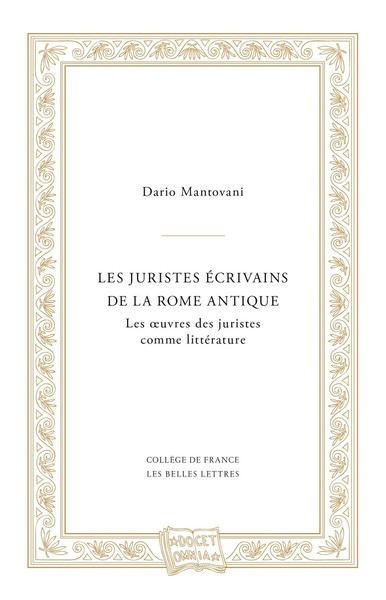- EAN13
- 9782251448138
- Éditeur
- Les Belles Lettres
- Date de publication
- 8 juin 2018
- Collection
- DOCET OMNIA
- Nombre de pages
- 360
- Dimensions
- 21 x 13,6 x 2 cm
- Poids
- 438 g
- Langue
- fre
Les Juristes Écrivains De La Rome Antique, Les Œuvres Des Juristes Comme Littérature
Dario Mantovani
Les Belles Lettres
Prix public : 25,00 €
Les juristes romains étaient-ils des écrivains ? Leurs œuvres constituent-elles une littérature ? <p>Grâce au Digeste de Justinien, les œuvres des juristes romains ont constitué le droit en vigueur dans de nombreux pays d’Europe, du XIe au XIXe siècle. Mais ces écrits ont suscité plus d’intérêt pour leur contenu juridique que pour leurs qualités littéraires. D’où cette question initiale : Les juristes romains étaient-ils des écrivains ? Leurs œuvres constituent-elles une littérature ?</p> <p>S’appuyant sur une documentation riche et variée, l’auteur propose, dans une approche au croisement du droit, de la philologie et de l’histoire, de redonner une place à cette « littérature invisible ». Soumettre les écrits des juristes aux méthodes et questions habituellement réservées aux œuvres littéraires permet d’identifier les nombreux liens que la pensée juridique a établis avec les autres domaines de la culture antique afin de parvenir à une résolution équitable des conflits grâce à l’argumentation.</p> <p>Partant du point de vue des lecteurs antiques, l’ouvrage présente trois attitudes que le juriste pouvait adopter dans sa pratique : celle du philosophe, de l’historien ou de l’enseignant.</p> <p>Cet ouvrage est issu d’un cycle de conférences dispensées au Collège de France.</p> Thanks to the Justinian's Digesta, the works of Roman jurists served as the backbone of law in many European countries, from the 11th up to the 19th centuries. But these writings generated more interest for their legal content than for their literary qualities. Hence these intial questions: were Roman jurists writers? do their works constitute a body of literature?
Supported by rich and varied materials, the author intends to give to this "hidden literature" its rightful place, in a way that mixes law, philology and history. Applying to the writings of Roman jurists the methodology literary scholars are accustomed to use when they approach works of Latin literature allows to identify the many links which legal though has established with other areas of Ancient culture in order to resolve conflicts fairly by means of argumentation.
Written from the point of view of readers of the Ancient times, the book presents three attitudes that a jurist could adopt in practice: the philosopher's, the historian's and the teacher's attitude.
Dario Mantovani is a professor at College de France, where he owns the Chair of « Law, Culture and Society of Ancient Rome ». He is the Director of the Centro di studi e ricerche sui Diritti antichi of the University of Pavie, and of the ERC project « Redhis – A New Appreciation of Juristic Texts and Patterns of Thought in Late Antiquity ». He wrote several books on the thought of Law in ancient Rome and its relation with culture and society.



















